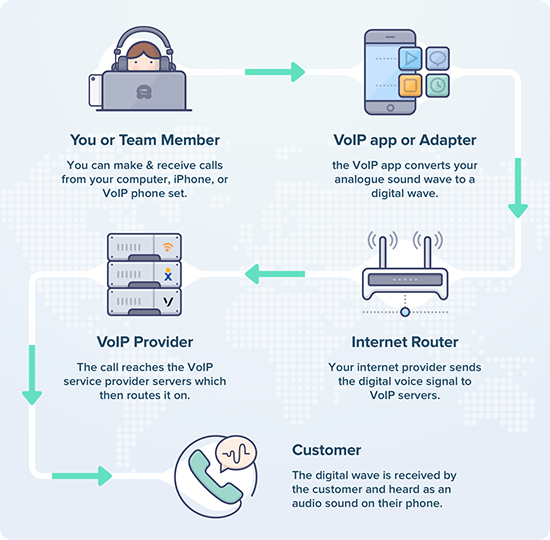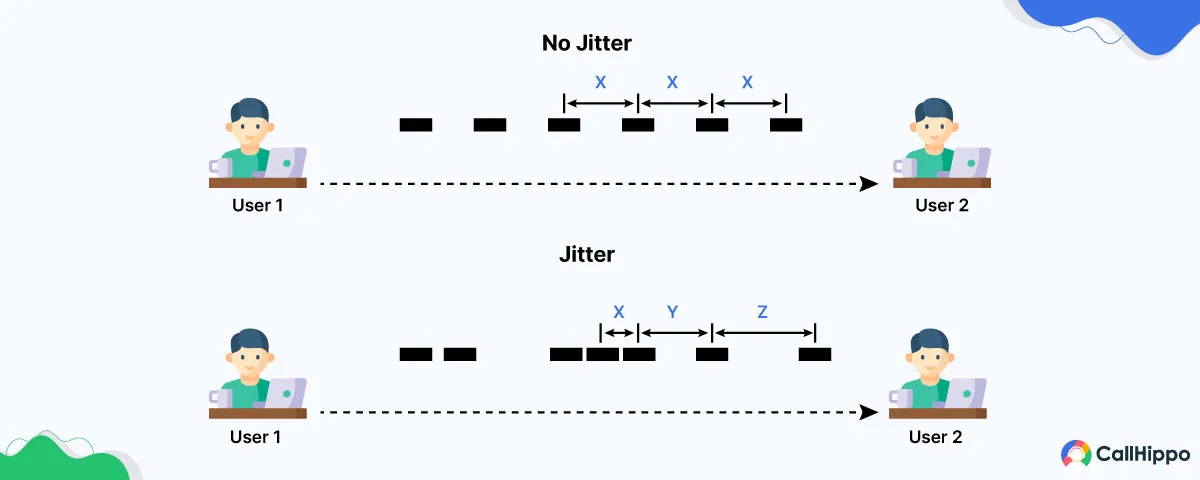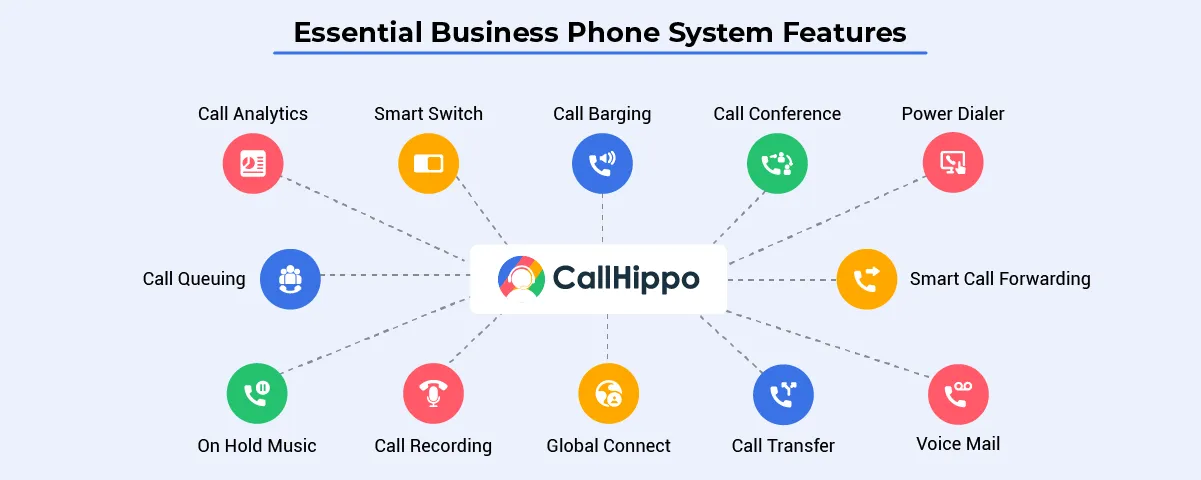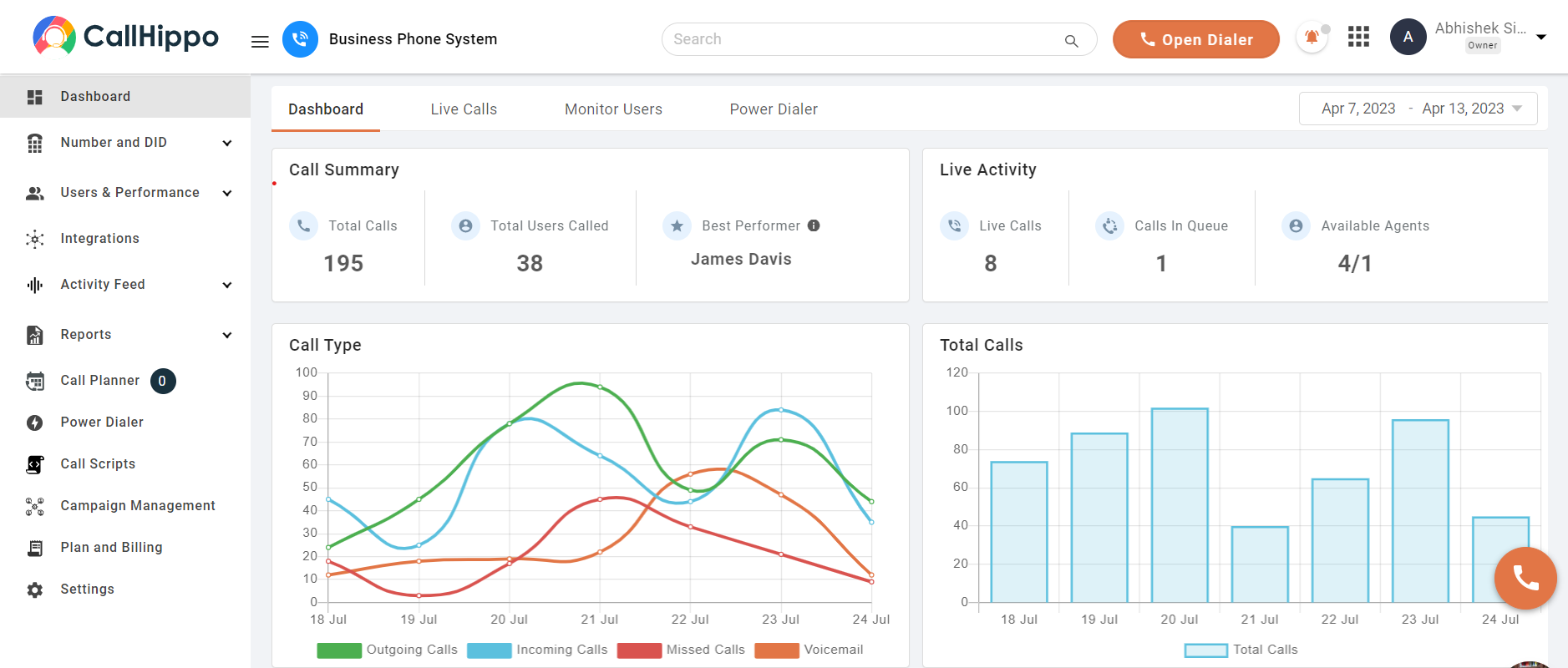Business communication has evolved significantly over the last few decades with the introduction of new technologies, including VoIP or Voice over Internet Protocols. According to Statista, around 31% of businesses currently use VoIP, and the number is rising.
However, confusion persists among many businesses when it comes to VoIP vs. Landline phone systems. This blog-cum-guide is specially designed for all such businesses.
In this guide, we will discuss key aspects around this topic, ranging from differences between VoIP and landline to VoIP vs. landline: Pros and Cons, and much more. Let’s get started.
When choosing a VoIP service, consider factors like call quality, reliability, scalability, and cost-effectiveness. Ensure the provider offers features important to your business, such as call routing options, mobile compatibility, and integration capabilities.
Lastly, research user reviews on leading software review websites like SoftwareSuggest to get insights from real users' experiences.
What is VoIP?
VoIP, or Voice over Internet Protocol, is a technology that allows you to make phone calls over the Internet instead of traditional phone lines. Unlike landline phone systems, which use physical wires, VoIP converts your voice into data packets and transmits them over the Internet. This means you can make calls using your computer, smartphone, or a special VoIP phone.

VoIP offers flexibility, cost savings, and advanced features like video conferencing and call forwarding. However, it relies on a stable internet connection, which may affect call quality. Landlines, on the other hand, have reliable connections but lack the versatility and cost-effectiveness of VoIP.
What is a Landline Phone?
In simple terms, a landline phone is a traditional telephone that connects through physical wires installed by a telephone company. Unlike mobile phones, landlines are fixed in one location, typically your home or office. They rely on a network of wires to transmit calls, making them stable and reliable.
Landline phones have been around for decades and are known for their clear audio quality. They don’t require an internet connection like VoIP phones do. However, they come with limitations such as higher costs, fewer features, and mobility issues.
When comparing VoIP vs. landline for business, it’s essential to consider factors like cost, features, scalability, and flexibility. While landlines offer stability, VoIP phones provide more advanced features and cost-effectiveness, making them increasingly popular among businesses today.
VoIP Vs. Landline Phone Systems: Key Differences
Let’s now look at the key differences between VoIP and landline systems to understand which one is better and why.
| Aspect | VoIP | Landline |
|---|---|---|
| Infrastructure | Relies on physical phone lines | |
| Cost | Generally higher | |
| Flexibility | Limited mobility | |
| Features | Basic calling functionality | |
| Reliability | Generally stable | |
| Integration | Limited integration capabilities |
A. Technology and Infrastructure
One of the major differences between VoIP and landline is technology. For example, VoIP technology converts voice signals into digital packets and transmits them over the internet. It leverages existing internet infrastructure, eliminating the need for separate phone lines.
Additionally, VoIP systems require compatible hardware, such as IP phones or softphones, which can be easily configured to connect to the service provider’s network. In contrast, traditional landline systems rely on copper wires and circuit-switched networks– requiring physical connections to each phone line.
Also, landline infrastructure maintenance involves regular checks and repairs on physical lines, while VoIP systems require less maintenance and are typically maintained by service providers.
B. Cost Efficiency
VoIP offers significant cost savings compared to traditional landlines. It typically involves lower setup costs as it utilizes existing internet infrastructure and requires minimal hardware investment.
VoIP providers often offer subscription-based pricing models, allowing businesses to pay for only the services they need without incurring additional charges for long-distance calls or advanced features. Additionally, VoIP’s scalability means businesses can easily add or remove lines as their needs evolve, minimizing upfront expenses.
On the other hand, landline systems may involve higher setup costs due to physical infrastructure requirements and incur additional charges for long-distance calls or line rentals. This eventually potentially resulted in higher overall expenses.
C. Flexibility and Scalability
The next major difference between VoIP and landline is scalability. For instance, VoIP provides unmatched flexibility, enabling employees to make and receive calls from any location with internet access.
Whether in the office, at home, or on the go, users can stay connected using various devices such as desktop computers, laptops, smartphones, or dedicated IP phones.
VoIP systems also offer advanced features like smart call forwarding, voicemail-to-email transcription, and local virtual phone numbers– improving communication efficiency. Furthermore, VoIP’s scalability allows businesses to easily adjust the number of lines or features according to their changing needs.
In contrast, landline systems are limited in flexibility– typically requiring physical installations and lacking remote access capabilities. This makes them less adaptable to modern work environments.
D. Call Quality and Reliability
VoIP technology has made significant advancements in call quality, with many providers like CallHippo offering HD voice and noise-cancellation features to ensure clear and crisp audio communication.

However, call quality in VoIP systems can be affected by factors such as internet speed, network congestion, and the quality of service provided by the VoIP provider. Reliable internet connectivity is crucial for maintaining consistent call quality and minimizing disruptions.
Landline systems are renowned for their high call quality and reliability, as they aren’t affected by internet-related issues. However, landline connections may experience disruptions due to physical line faults, maintenance outages, or natural disasters, which can impact business continuity.
E. Features and Integration
VoIP systems offer a range of advanced features and integration capabilities that enhance communication efficiency and collaboration within businesses. From video conferencing to call analytics and CRM integration, VoIP empowers businesses with tools to streamline communication processes and improve customer interactions.
Additionally, VoIP systems can be seamlessly integrated with other business applications, allowing for enhanced workflow automation and data synchronization.
On the other hand, landline systems typically offer basic features such as call waiting, caller ID, and voicemail, but lack the advanced functionalities and integration capabilities of VoIP. Besides, landline systems may require additional hardware to achieve similar levels of functionality and integration.
VoIP Phone Vs Landline Phone: Pros & Cons
When considering the switch from a traditional landline to VoIP (Voice over Internet Protocol) for your business, it’s crucial to weigh the pros and cons. While VoIP offers many benefits, there are also some drawbacks. Let’s start with the pros of the VoIP phone system.
Pros of VoIP Phone Systems
Based on the information shared thus far, it must have become quite clear to you that VoIP is the ideal phone solution for your business. But what exactly are the benefits of switching to VoIP, and how do they compare to traditional landline services? Let’s explore five key advantages of VoIP for businesses.
A. Cost Savings
One of the most significant advantages of VoIP over traditional landlines is cost savings. VoIP phone systems typically offer lower monthly service fees and cheaper international call rates compared to traditional landline services.
- Businesses can save up to 80% on international calls compared to traditional phone lines.[Source: Forbes]
- Businesses see average savings between 30% and 50% on communication expenses by switching to VoIP. [Source: Tech.co]
- VoIP eliminates the need for expensive hardware installations, bringing startup costs down by up to a whopping 90%. [Source: Nextiva]
Since VoIP utilizes the internet to transmit voice data, businesses can eliminate the need for expensive phone lines and infrastructure, resulting in substantial cost savings over time.
B. Flexibility and Scalability
VoIP offers unparalleled flexibility and scalability for businesses of all sizes. Unlike traditional landlines, which require physical phone lines to be installed and maintained, VoIP operates over the internet, allowing for easy expansion and customization.
With VoIP, businesses can add or remove phone lines as needed without the hassle of scheduling technician visits or dealing with complicated wiring.
C. Advanced Features
VoIP phone systems come equipped with a wide range of advanced features that can enhance productivity and communication within your business. Features such as voicemail-to-email transcription, call forwarding, auto-attendants, and video conferencing capabilities are standard with most VoIP service providers.

These features empower businesses to streamline their communication processes and collaborate more effectively with remote teams and clients.
D. Mobility
The next significant advantage of VoIP is its mobility. With VoIP, employees can make and receive calls from anywhere with an internet connection, whether they’re in the office, at home, or on the go.
This level of mobility is especially beneficial for businesses with remote or mobile workforce, as it enables seamless communication regardless of location. Additionally, VoIP phone systems often come with mobile apps that allow users to access their business phone system from their smartphones or tablets.
E. Integration with Business Applications
VoIP phone systems can integrate seamlessly with other business applications and software, such as customer relationship management (CRM) systems and business communication tools. This integration enables businesses to streamline workflows, improve efficiency, and provide better customer service.
For example, incoming calls can be automatically logged in the CRM system, allowing employees to access customer information quickly and eventually personalize their interactions.
As we can see, from cost savings and flexibility to advanced features and mobility, VoIP offers a comprehensive communication solution that can help businesses thrive in today’s fast-paced digital world.
Now, let’s explore some major cons of VoIP phone systems.
Cons of VoIP Phone System
While VoIP (Voice over Internet Protocol) offers numerous benefits, such as cost savings and flexibility, it also comes with its share of drawbacks that businesses need to consider.
A. Dependence on Internet Connection
One of the primary cons of switching to VoIP is the reliance on a stable internet connection. Unlike traditional landlines, which operate independently of internet connectivity, VoIP requires a robust and consistent internet connection to function effectively.
If your internet service experiences disruptions or downtime, it can directly impact your ability to make and receive calls, leading to communication disruptions and potential business losses.
This dependency on internet connectivity makes VoIP vulnerable to outages caused by factors like network congestion or technical issues, which may not be within your control.
B. Quality of Service Issues
While VoIP technology has improved significantly over the years, quality of service (QoS) issues can still arise, particularly during periods of high internet traffic or inadequate network infrastructure.
Factors such as latency, jitter, and packet loss can affect call quality, resulting in issues like dropped calls, poor audio clarity, and delays in communication. These quality-related concerns can undermine the professionalism of your business communications and frustrate both employees and customers.
Addressing QoS issues often requires troubleshooting your network setup, investing in quality routers and switches, and working closely with your internet service provider to optimize performance, all of which can entail additional time and expenses.
C. Emergency Call Limitations
Unlike traditional landline systems, which are associated with a physical address and automatically transmit location information to emergency services when a call is made, VoIP presents challenges in accurately identifying the caller’s location during emergency situations. This discrepancy can pose a safety risk, especially if your business relies on VoIP as its primary communication channel.
While regulations like the FCC’s Enhanced 911 (E911) requirements aim to address this issue by mandating VoIP providers to provide location information to emergency services, compliance may vary, and there’s still a risk of inaccurate or delayed responses during emergencies.
In conclusion, while VoIP offers numerous advantages over traditional landline systems, including cost savings, scalability, and advanced features, businesses must also be mindful of its drawbacks.
Who Benefits the Most from VoIP?
Although VoIP is an ideal communication solution for all kinds of businesses and industries, understanding who stands to gain the most from VoIP is crucial for businesses considering this option. Let’s look at some of the major sectors that benefit the most from VoIP.
A. Tech Startups and Small Businesses
VoIP offers significant cost savings for startups and small businesses. Unlike traditional landlines that require extensive hardware installation and maintenance, VoIP operates over the internet, eliminating the need for complex infrastructure. Additionally, VoIP providers often offer flexible pricing plans tailored to the needs of small businesses, enabling them to scale their communication systems as they grow.
B. Remote Workforce and Freelancers
With the rise of remote work, VoIP has become indispensable for businesses with dispersed teams. VoIP allows employees to make and receive calls from anywhere with an internet connection, facilitating seamless communication. Additionally, features like video conferencing and mobile apps enhance collaboration among remote workers– making VoIP the preferred choice for companies.
C. Customer Service and Call Centers
VoIP offers advanced features that enhance customer service capabilities. Call forwarding, interactive voice response (IVR), and automatic call distribution (ACD) streamline incoming calls, ensuring efficient handling of customer inquiries. Moreover, VoIP integrates seamlessly with CRM systems, enabling agents to access customer information and provide personalized service.
D. Global Enterprises and Multinational Corporations
For large enterprises operating across multiple locations worldwide, VoIP provides a unified communication solution. By consolidating communication channels onto a single platform, VoIP reduces complexity and improves connectivity among global teams. International calling rates are typically lower with VoIP compared to traditional landlines– resulting in substantial cost savings.
All in all, whether you’re a tech startup, a remote team, a customer service-centric organization, or a multinational corporation, VoIP offers the scalability, efficiency, and connectivity needed to thrive in today’s dynamic business landscape.

What Makes CallHippo the Best VoIP Phone System?
CallHippo offers everything that any business expects from a VoIP phone system. It provides an extensive suite of advanced and AI-powered features, affordable pricing plans, prompt customer support, exceptional reliability, a massive pool of area codes for local presence, and much more.

Let’s discuss the three major aspects that make it the best VoIP phone system in the current market.
A. Features
The first thing that gives CallHippo an edge over its competitors is its wide range of features designed keeping in mind the user’s issues and expectations. Some of its notable features include:
- Power Dialer
- Smart Switch
- Global Connect
- Call Barging
- Call Analytics
- Automatic Call Distribution
- Interactive Voice Response- IVR
- Gamification
In addition to these basic features, CallHippo has also introduced a range of AI-powered features to help businesses stay current with changing trends.
B. Reliability & Flexibility
No matter how well-designed the VoIP system is, if it experiences higher downtime, it is of no use. Luckily, CallHippo has addressed this issue by focusing on reliability aspects. They have developed a strong infrastructure across regions and continually improve it to enhance reliability.
Thanks to these efforts, CallHippo boasts a 99.99% system uptime rate with zero jitter and call disconnect rate. Additionally, they allow you to scale your resources as needed by simply requesting your requirements.
These factors empower you to keep your business running 24/7 without worrying about downtime or resource shortages.
C. Pricing
The third major facet that makes CallHippo one of the most preferred VoIP phone systems is its competitive pricing. As of April 2024, CallHippo offers four pricing options:
- Basic Plan: $0/User/Month
- Starter Plan: $18/User/Month
- Professional Plan: $30/User/Month
- Ultimate Plan: $42/User/Month
All these plans come with a different set of features added based on the requirements of business size. For example, the basic plan is suitable for startups, while the professional plan is suitable for medium or large-scale businesses.
Likewise, if you are looking for a custom plan with a complete package of features, go with the Ultimate plan.
In addition to these pricing options, CallHippo also offers multiple add-ons that you may use to further enhance your efficiency.
To sum up, features, reliability, and pricing are the three major elements that make CallHippo the best VoIP phone system for businesses of all types and scales.
Conclusion
While both VoIP and landline systems have their merits, the advantages of VoIP, such as cost-effectiveness, flexibility, scalability, and advanced features, make it the superior choice for most businesses in today’s digital age. With VoIP, businesses can enjoy enhanced communication capabilities without paying hefty costs, ensuring they stay competitive in an ever-evolving business market. Start CallHippo free trial today to experience its potential first-hand.
FAQs
1. How can I convert my landline to VoIP?
The virtual phone system provider, like CallHippo, allows you to port your landline number to virtual numbers by simply following these steps.
2. Is a landline necessary if I have VoIP?
No, a landline is not necessary if you have VoIP. VoIP allows you to make calls over the internet, eliminating the need for traditional landline infrastructure.
3. Are VoIP calls typically free?
No, VoIP calls are typically not free. However, the cost of calling from VoIP is much more affordable than traditional phone systems.
4. How can I convert my regular phone to VoIP?
To convert your regular phone to VoIP, simply follow the steps outlined here.

Subscribe to our newsletter & never miss our latest news and promotions.









